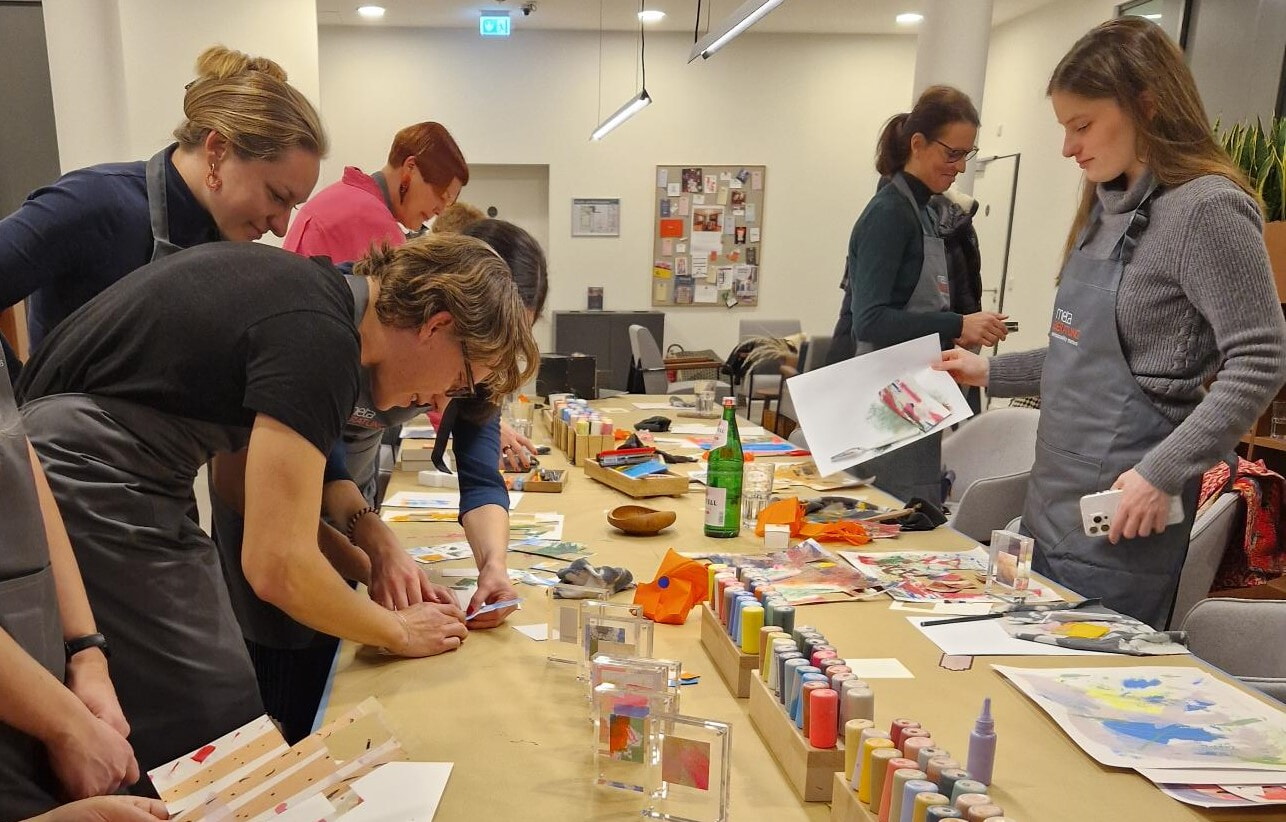Personality & Resilience: The Foundation of Inner Strength
Lily Rose Golebiowski, M. Sc. in Psychology, on personality traits as inner resources that promote resilience, using Teresa Enke's story as an example.
Date: 6. May 2025
Categories: Personality, Personality Assessments, Insights, metaArticle

Personality & Resilience: The Foundation of Inner Strength
Over the past decade, the number of days lost to stress and mental illness has increased by more than 50 percent.[1] By 2023, mental illness will rank third in terms of days lost due to sickness in the workplace.[2] Depression alone costs the economy up to 22 billion euros a year.[3]
More and more companies are recognizing resilience as a key factor in ensuring not only the well-being of their employees, but also the economic success of their business. But what exactly does this term mean, and how can we specifically promote resilience?
From Deep Pain to Emotional Strength and Productivity – The Example of Teresa Enke
Teresa Enke is the widow of former German national team goalkeeper Robert Enke. Her life has been marked by two major strokes of fate. After her daughter died of a serious heart defect in 2006, her husband took his own life in 2009 due to depression. In 2010, Teresa Enke founded the Robert Enke Foundation, a charitable organization dedicated to raising awareness of mental illness and heart disease in children. Since then, the Foundation has focused on raising public awareness of mental health and combating the stigma of mental illness. Teresa Enke experienced deep emotional trauma, but rather than allowing her grief to overwhelm her, she found the strength to become a public advocate and turn her pain into a source of productivity. Enke’s story touches many. Most importantly, her strength is inspiring and raises a central question: What enables people to remain active and productive even in the midst of life’s most severe crises, while others are overwhelmed by their pain?
Resilience as the Key to Inner Strength – A Psychological Resilience
Resilience is the ability to recover from stressful or traumatic experiences and maintain mental health in the face of difficult life circumstances.[4] This does not mean the absence of vulnerability, but rather the ability to adaptively cope with stress and adversity while maintaining normal mental and physical functioning.[5][6] Resilient people have strategies, personal resources, and attitudes that enable them to face challenges, remain capable of action, and use pain as a starting point for personal growth.[7] Teresa Enke is a powerful example of this form of psychological resilience. After her tragic losses, she found the courage to speak publicly about mental health and give a voice to those affected. What personality traits make such a constructive response to profound life crises possible?
Inner Strength Made Visible – Teresa Enke in the Light of the Hogan Dimensions
Hogan Potentials: Strengths and Weaknesses in Everyday Life (Hogan Personality Inventory)
Adjustment: Instead of sinking into despair, she maintained emotional stability and decided to create something meaningful out of her pain.
- The ability to accept allows her to realize that not everything in life is controllable, coupled with the strength to let go and adapt flexibly to new situations.
- Her optimism is reflected in her ability to maintain a hopeful and positive outlook on the future despite personal setbacks. The establishment of the Foundation was therefore not only an act of remembrance, but also an expression of her belief that her commitment can help those affected and their families.
Prudence: Even in the midst of deep personal crises, she did not allow negative emotions to overwhelm her and remained calm.
- Her low emotional irritability enabled her to maintain an inner balance. She remained conscientious and in control, acting with deliberation and a clear head.
Ambition: With her inner drive and energy, she took the initiative to start a foundation and stepped into a leadership role instead of stepping back.-
- This courageous step required not only commitment, but also leadership.
- In doing so, she took on the responsibility and challenge of breaking the silence and stigma surrounding a previously taboo subject – mental illness.
- At the same time, her actions demonstrate a strong sense of self-efficacy – a belief in her own ability to overcome difficult situations and make a difference.
- Her actions are action, goal and solution oriented, guided by a clear vision.
Interpersonal Sensitivity: Despite her own difficult life situation, she never seems to lose sight of others and shows empathy.
- Through the Foundation and her public relations work, she provides long-term support to those affected and their families.
Sociability: The ability to communicate openly and empathetically with others, even in difficult situations, promotes the development of a stable support network.
- Teresa Enke made a conscious decision to share her personal story publicly, thereby taking an active role in public discourse.
- Her social skills enable her to build trust and get people talking.
- She promotes the exchange of ideas about mental health and encourages openness in order to make an issue of great social relevance emotionally tangible.
Inquisitive and Learning Approach: Both of these traits contribute to the acceptance of challenges as learning opportunities for continuous development.
- She works intensively with mental illnesses, actively seeks to exchange ideas with experts, and continues to educate herself, both out of personal interest and to fulfill her responsibility as the founder of the Foundation.
Hogan Values: Core Values, Goals, and Interests (Motives, Values, Preferences Inventory)
Altruistic: The need to help others, improve society, and help those less fortunate.
- She overcame her own suffering and turned her own grief into a vision to help others who were grieving.
Affiliation: The need for regular and varied social contact
- Teresa has strong social skills. This is important for seeking support in difficult situations and for maintaining sustainable social relationships.
Tradition: Concern for morality, family values, and devotion to duty
- Your strong connection to tradition is particularly evident in the areas of family values and responsibility. Their commitment to the Foundation and their moral convictions are based on a fundamental understanding of ethics and responsibility, which goes hand in hand with traditional values such as care and a sense of duty.
- A strong sense of tradition and a clear understanding of ethical values provide additional support and foster a strong sense of responsibility.
Take-Home-Message
Teresa Enke’s story is an impressive example of resilience. It illustrates how personality traits as inner resources significantly influence how people deal with profound crises. Our assessments offer the opportunity to identify such personalities. In addition, resilience can be learned and continuously promoted to ensure mental health in the workplace. [8]
We offer customized certifications, workshops and coaching and are happy to advise you!
References:
[1] https://www.iges.com/kunden/gesundheit/forschungsergebnisse/2024/psychreport-2024/index_ger.html
[2] https://www.iges.com/kunden/gesundheit/forschungsergebnisse/2024/psychreport-2024/index_ger.html
[3] https://www.fr.de/wissen/milliarden-euro-schaden-durch-depressionen-11421048.html?utm_source
[4] Herrman, H., Stewart, D. E., Diaz-Granados, N., Berger, E. L., Jackson, B., & Yuen, T. (2011). What is resilience?. The Canadian Journal of Psychiatry, 56(5), 258-265.
[5] Russo, S. J., Murrough, J. W., Han, M. H., Charney, D. S., & Nestler, E. J. (2012). Neurobiology of resilience. Nature neuroscience, 15(11), 1475-1484.
[6] Rutter, M. (2012). Resilience as a dynamic concept. Development and psychopathology, 24(2), 335-344.
[7] Southwick, S. M., & Charney, D. S. (2012). The science of resilience: implications for the prevention and treatment of depression. Science, 338(6103), 79-82.
[8] McAllister, M., & McKinnon, J. (2009). The importance of teaching and learning resilience in the health disciplines: a critical review of the literature. Nurse education today, 29(4), 371-379.



